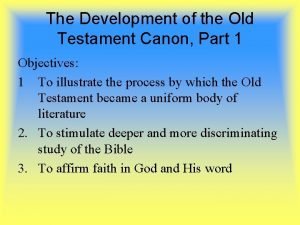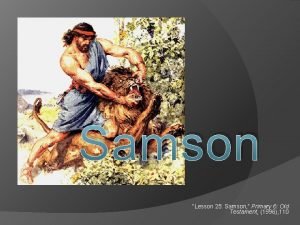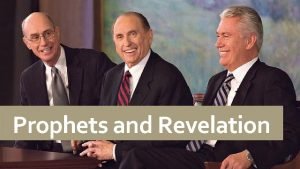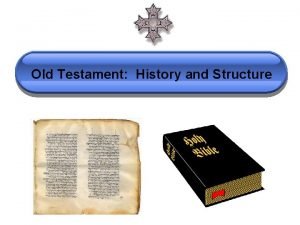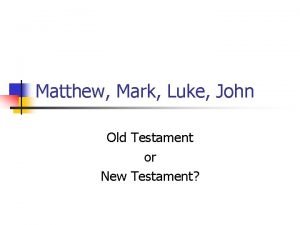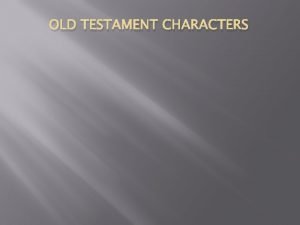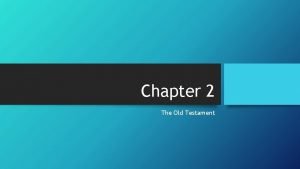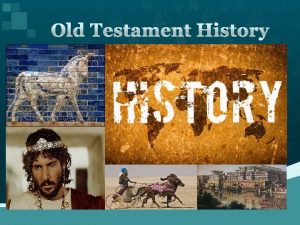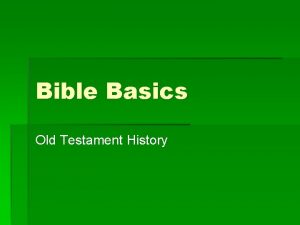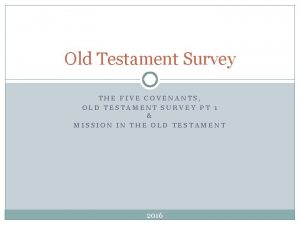Cards 29 31 LOVE STORY OF OLD TESTAMENT






- Slides: 6

Cards 29 -31 “LOVE STORY” OF OLD TESTAMENT RUTH In Bethlehem there lived a man called Elimelech with his wife Naomi and their two sons. They were not rich or important, but they were happy. Their only serious worry was that there was a famine in the land it was very difficult to get enough to eat. It grew so bad that at last they decided they would have to leave the country and go and look for food some where else. So they set off on foot for Moab, a distance of about 80 km (54 miles). When they arrived they soon grew to like their new home and thought they would remain there, but it was not long before Elimelech died, leaving Naomi to support her two sons. In time the sons married two Moabite girls named Orpah and Ruth, fine girls of good character, who gave Naomi great contentment. For about ten years they all continued to live happily, and then tragedy struck again and both the sons died. Naomi now only had Orpah and Ruth, but both the girls were very fond of her and did all they could for her. Some time later, Naomi heard that the famine was over in her country and she decided it would be wise to go back. She started out, and Orpah and Ruth went with her. Then Naomi remembered that the girls were Moabites and would be leaving their own country. “Go back home to your own mothers, ’ she said, ‘and may God deal kindly with you and make it possible for you to marry again. ’ She kissed them goodbye, but the girls did not want to leave her. ‘No, ’ they said, ‘we will go with you to your people. ’ Naomi implored then again that it would be better for them to stay in their own country, and at last Orpah agreed to go back. ‘Look, ’ said Naomi to Ruth, ‘your sister-in-law has gone back; why don’t you go too? ’ Ruth refused and said, ‘Don’t ask me to leave you; for where you go I will go, and where you lodge I will lodge; your people shall be my people and your God my God; only death will part me from you. ’ When Naomi saw that Ruth was so determined to stay with her, she said no more, and the two of them went on to Bethlehem. The people in Bethlehem were very pleased to see Naomi again, but very sad when they heard of all that had happened to her, and how she had lost not only her husband, but both her sons also. Continued on next slide

The barley harvest was just beginning in Bethlehem and Ruth decided she must go out and work in the fields in order to keep both of them up. So she went into one of the fields. It was the kindly custom of the reapers to have some grain round the edges of the field so that the poor might come and gather it. This was called “gleaning” and this is what Ruth did. It so happened that the field in which she was gleaning belonged to a man named Boaz. When Boaz noticed Ruth, he asked some of his workers who she was. When they had told him her story, he called her over and said, ‘I’ve heard about your kindness in not leaving your mother-in-law. Don’t go and glean in another field; you can stay here with my maidens, and I will see that no harm comes to you. When you feel thirsty, you may drink from these water jars here. ’ ‘You are very kind, sir, ’ said Ruth gratefully. Boaz then asked her to share the meal with his workers; and when work started again, he told the workers to let her glean among the sheaves and to pull out and drop some extra barley from their bundles for Ruth to pick up. Ruth worked on until evening and found that she had nearly 10 kg (22 lb) of barley. Joyfully she took it back to Naomi. ‘How did you get all this? ’ asked Naomi. ‘Where have you been working? ’ ‘In a field belonging to a man named Boaz, ’ said Ruth. ‘Boaz!’ exclaimed Naomi, ‘but he is one of our close relatives!’ ‘He said I could work there until they have finished the harvest’ said Ruth, and Naomi was pleased to hear it. So every day Ruth went to work in Boaz’s fields until all the barley and wheat had been gathered in. She got to know Boaz very well. Now it was the custom in those days that if a man died leaving no children, his brother or next-of-kin had to marry the widow in order that there should be an heir; he had also to buy the dead man’s land in order to keep it in the family. Continued on next slide

Boaz was a close relative and therefore he felt some responsibility for Ruth; but he was not her closest relative. So he said to her, ‘Tomorrow we will find out whether your closest relative will take on responsibility for you. If he will, then well and good; but if not, then I will do so myself and marry you. ’ The next day Boaz went up to the city gate where people gathered, and where he knew he would catch Ruth’s closest relative. At the gate legal business was carried on and there were plenty of people about to act as witnesses to any deals or agreements that were made. When the man came by, Boaz called him over and asked him to sit down. He also asked then of the city leaders to come and sit with him too. Then he said to Ruth’s relative, ‘You know that our relative Naomi had come back from Moab, having lost her husband sons? As your are the nearest relative, you can buy the piece of land which belonged to Elimelech. If you do not want it, say so, and I will buy it. ’ ‘I will buy it’, said the man. Then, according to the law, you must also take Ruth, the widow of Naomi’s eldest son, so that the field will stay in the family of the dead man, ’ said Boaz The man thought about it and then he said, ‘In that case I will not buy, because the arrangement would interfere with the rights of my own children. You may buy it. ’ In those days, a sale or exchange of property was settled by the man who was selling taking off his sandal and handing it to the man who was buying. This was a sign that possession was taken. So the closest relative took off his sandal and handed it to Boaz looked at the city leaders and at the other people who had gathered round, and said, ‘You are witnesses that today I have bought from Naomi the land which belonged to Elimelech and his sons, and that Ruth becomes my wife. ’ So Boaz married Ruth, and in due time they had a son. The child was named Obed and, years later, he too had a grandson who was to become the great King David.

“LOVE STORY” OF THE OLD TESTAMENT A. Ezra B. Ruth C. Joel 1. Why did Elimelech’s family have to leave Bethlehem? 2. To what land did they go? 3. What happened to Naomi’s husband sons? 4. Did Naomi want to go back to her county after the famine was over? 5. What was the names of Naomi’s two daughter-in-laws? 6. Were they wanting to go with her? 7. One went back—which one stayed with Naomi? 8. In whose field did Ruth find work? 9. What did he tell the workers to do for Ruth? 10. After some time what did Boaz want to do for Ruth? 11. In those days a sale of property was settled by what action? 12. Boaz and Ruth are in the lineage of what great king?

RUTH’S MOTHER-IN-LAW?

EVENTS IN RUTH? Return to B_______? Death of Ruth’s _______? Marriage to ______?


